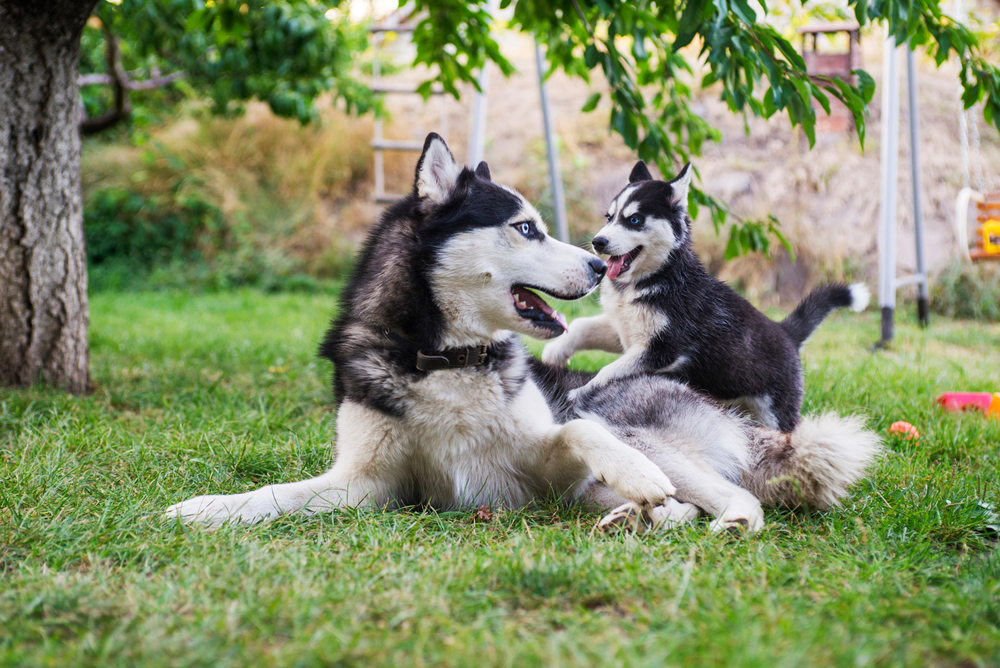Nothing warms the heart like seeing a mother dog snuggling with her adorable puppies, but we know this will end. Once puppies are weaned, strong, and independent, they usually say goodbye to their mother and siblings and join a new family. Thinking from a human perspective, having our babies taken away at school age would be horrifying, so it's natural to wonder how dogs feel when their puppies go to new homes. When we try to see things through our dogs' eyes, we sometimes get confused and see their lives from our perspective. Although we can never truly know what our dogs feel, we can use logic, science, and behavior to better understand their emotional experience. So, Do Mother Dogs Miss Their Puppies? The answer is more complex than you might think. Read on to learn more.

The Problem with Over-Identifying With Our Dogs
Many of us are guilty of 'anthropomorphism,' projecting human logic, interpretations, and emotions onto other animals. While better than being apathetic, it doesn't always give an accurate picture. We can't know for sure how animals feel, but we can look at their behavior, actions, and relationships for a more objective interpretation. Objectively, animal behavior is motivated by survival and reproduction. But humans are motivated by more than just survival. Have dogs' wants and needs changed after evolving with humans for at least 10,000 years?

Wolf Pack Dynamics
To understand how canine relationships evolved, we can look at their wild ancestors. In a wolf pack, usually only one breeding pair exists to reduce friction and inbreeding. Wolf pups stay with their natal pack for 2 - 3 years. Once sexually mature, they often disperse. Sometimes, same-sex siblings stay together. There's affection and bonding in the pack, but it also happens between non-related individuals. Canines are emotional beings that form relationships, but their need to disperse and reproduce may overrule bonds. They may not make return visits, though there are exceptions.
Has Domestication Affected Canine Emotions?
Dogs can form emotional attachments, but how does that compare to the bond between a mother and her puppies? Part of the answer lies in how domestication has changed canine emotions and if it impacts their relationship with puppies. Forming bonds with humans has given dogs an evolutionary advantage. Domestication has shifted their priorities from genetic proliferation to seeking comfort and companionship. Clinically, there may be no evolutionary advantage to stronger mother-puppy bonds. Puppies may be seen as competition for resources, and mothers expect them to leave once sexually mature.

Do Dogs Miss Their Puppies?
On some level, a mother dog will feel the loss of her puppies. But with a 63-day gestation and puppies leaving at 8 - 12 weeks, she'll be ready for a new litter in 2 - 3 months. Owners and breeders rarely report signs of depression in dogs whose puppies have left. In fact, they may get impatient with clinging older pups. A mother dog may also reject, kill, or consume unwell puppies; her emotional attachment is different from ours.

Why Does It Matter?
Some think all dogs should have puppies to experience motherhood, but this assumes things about dogs' feelings. Breeding a dog has no health or behavioral benefits. Research shows spaying before the second season increases lifespan. With the number of stray dogs increasing, it's best not to breed dogs unnecessarily. Allowing a dog to 'experience motherhood' assumes an emotional attachment that may not exist after weaning.

Final Thoughts
While dogs are important, we must acknowledge they are dogs with different needs. Unlike humans, dogs birth and nurture their litter until they can fend for themselves, then move on. In the wild, canids migrate once sexually mature. For domesticated dogs, there's no advantage in keeping pups longer than necessary. A mother dog may feel loss when her puppies leave, but there's no evidence or evolutionary reason for mourning. Dogs reproduce by instinct and distance themselves from offspring. Through domestication, dogs find companionship in human families, and those attachments last a lifetime.
Featured Image Credit: Ellis Berankova, Shutterstock

